魅惑の世界へようこそ metallic powders! If you’ve ever been curious about the tiny particles that make up some of the most innovative materials in modern manufacturing, you’re in the right place. This guide will delve deep into metallic powders, exploring their types, compositions, properties, applications, and much more. Whether you’re a seasoned engineer, a curious student, or just someone with a keen interest in materials science, there’s something here for you.
Overview of Metallic Powders
Metallic powders are fine particles of metals used in various industrial applications. These powders are essential in manufacturing, offering unique properties that make them suitable for creating complex shapes, achieving specific mechanical properties, and producing materials with enhanced performance characteristics. From additive manufacturing (3D printing) to powder metallurgy and beyond, metallic powders play a crucial role in modern technology.
主な内容
- 定義: Finely divided particles of metal.
- 生産手法:アトマイズ、還元、電解、メカニカルアロイング。
- アプリケーション: Additive manufacturing, powder metallurgy, thermal spraying, MIM (Metal Injection Molding).
- 利点: High precision, material efficiency, complex shapes, customizable properties.
- 欠点: Cost, handling hazards, powder consistency.
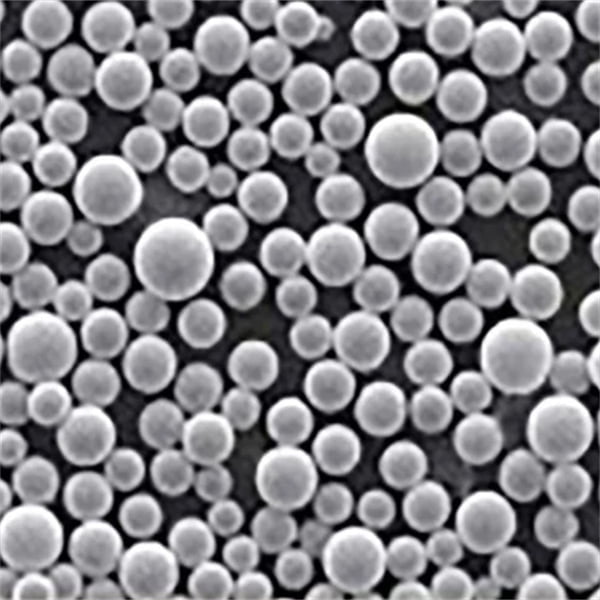
種類 金属粉
1.アルミニウムパウダー
Aluminum powder is lightweight, corrosion-resistant, and highly conductive. It’s widely used in automotive parts, aerospace components, and fireworks.
作曲: Pure aluminum or aluminum alloys.
プロパティ:
- 軽量
- 高い熱伝導率と電気伝導率
- 耐腐食性が高い
アプリケーション:
- 自動車用部品
- 航空宇宙コンポーネント
- 増材製造
2. Copper Powder
Copper powder is known for its excellent electrical and thermal conductivity. It’s a key material in electronics, batteries, and conductive inks.
作曲: Pure copper or copper alloys.
プロパティ:
- 優れた導電性
- 高い熱伝導率
- Antimicrobial properties
アプリケーション:
- エレクトロニクス
- Batteries
- Conductive inks
3.鉄粉
Iron powder is versatile, used in various applications from automotive to industrial manufacturing. It’s known for its magnetic properties and strength.
作曲: Pure iron or iron alloys.
プロパティ:
- High magnetic permeability
- Strong and durable
- 費用対効果
アプリケーション:
- 粉末冶金
- Magnetic materials
- 自動車用部品
4. Titanium Powder
Titanium powder is highly valued for its strength, lightweight nature, and corrosion resistance, making it ideal for aerospace and medical implants.
作曲: Pure titanium or titanium alloys.
プロパティ:
- 高い強度重量比
- 耐腐食性に優れています
- 生体適合性
アプリケーション:
- 航空宇宙コンポーネント
- 医療用インプラント
- 増材製造
5.ニッケルパウダー
Nickel powder is used in batteries, catalysts, and electronics due to its excellent corrosion resistance and high-temperature stability.
作曲: Pure nickel or nickel alloys.
プロパティ:
- 耐腐食性に優れています
- 高温安定性
- Good mechanical properties
アプリケーション:
- Batteries
- 触媒
- エレクトロニクス
6. Stainless Steel Powder
Stainless steel powder combines the benefits of iron and chromium, offering corrosion resistance and strength. It’s used in a wide range of applications.
作曲: Iron-chromium alloys.
プロパティ:
- 耐蝕性
- 強力
- 耐摩耗性
アプリケーション:
- 医療機器
- Food processing equipment
- 増材製造
7. Cobalt Powder
Cobalt powder is crucial in high-performance alloys and battery materials, known for its magnetic properties and high melting point.
作曲: Pure cobalt or cobalt alloys.
プロパティ:
- 高い融点
- 磁気特性
- 耐摩耗性
アプリケーション:
- 高性能合金
- Batteries
- Cutting tools
8. Zinc Powder
Zinc powder is widely used in protective coatings and batteries due to its anti-corrosion properties and electrochemical behavior.
作曲: Pure zinc or zinc alloys.
プロパティ:
- Anti-corrosion properties
- Good electrochemical behavior
- High reactivity
アプリケーション:
- Protective coatings
- Batteries
- Chemical reagents
9. Tungsten Powder
Tungsten powder is used in high-temperature applications and radiation shielding, valued for its high density and melting point.
作曲: Pure tungsten or tungsten alloys.
プロパティ:
- 高密度
- 高い融点
- 優れた耐摩耗性
アプリケーション:
- 高温アプリケーション
- Radiation shielding
- Cutting tools
10. Magnesium Powder
Magnesium powder is lightweight and has high specific strength, used in aerospace, automotive, and electronics industries.
作曲: Pure magnesium or magnesium alloys.
プロパティ:
- 軽量
- High specific strength
- 良好な加工性
アプリケーション:
- 航空宇宙コンポーネント
- 自動車用部品
- エレクトロニクス
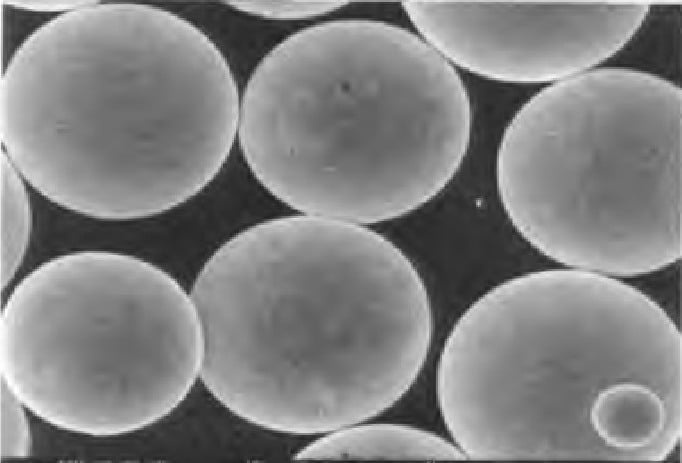
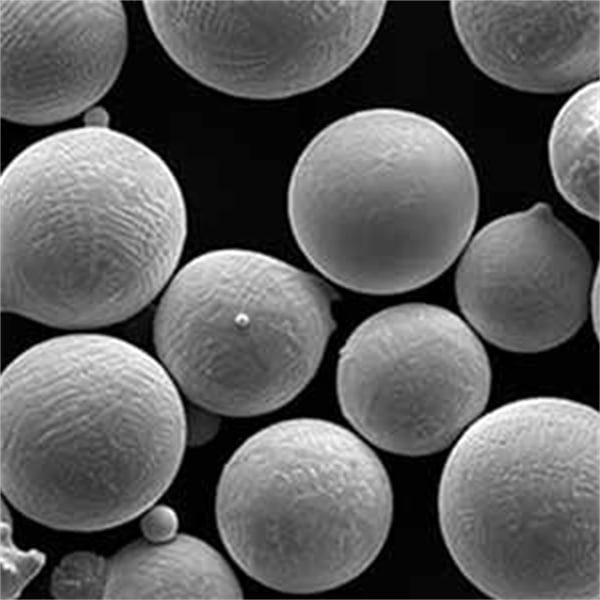
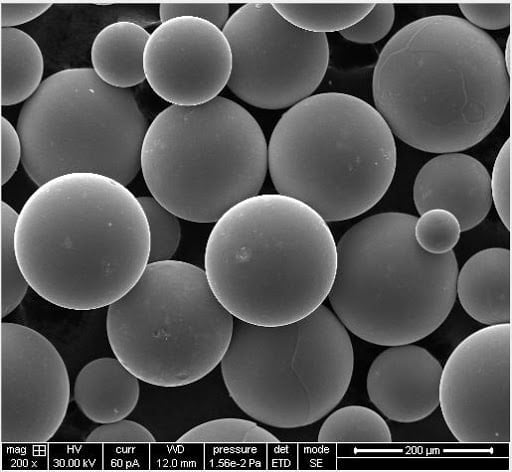
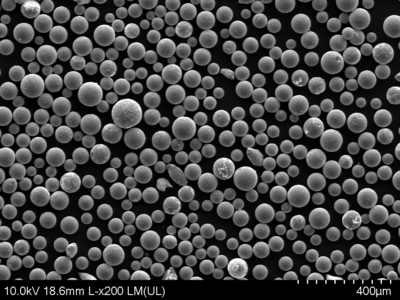
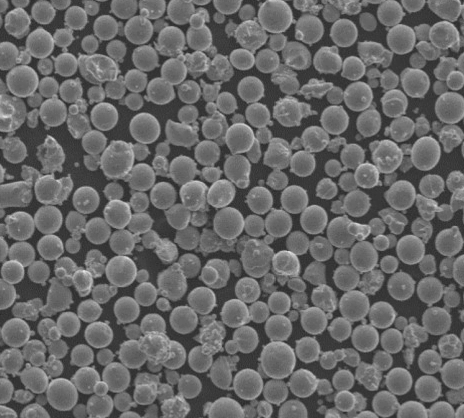
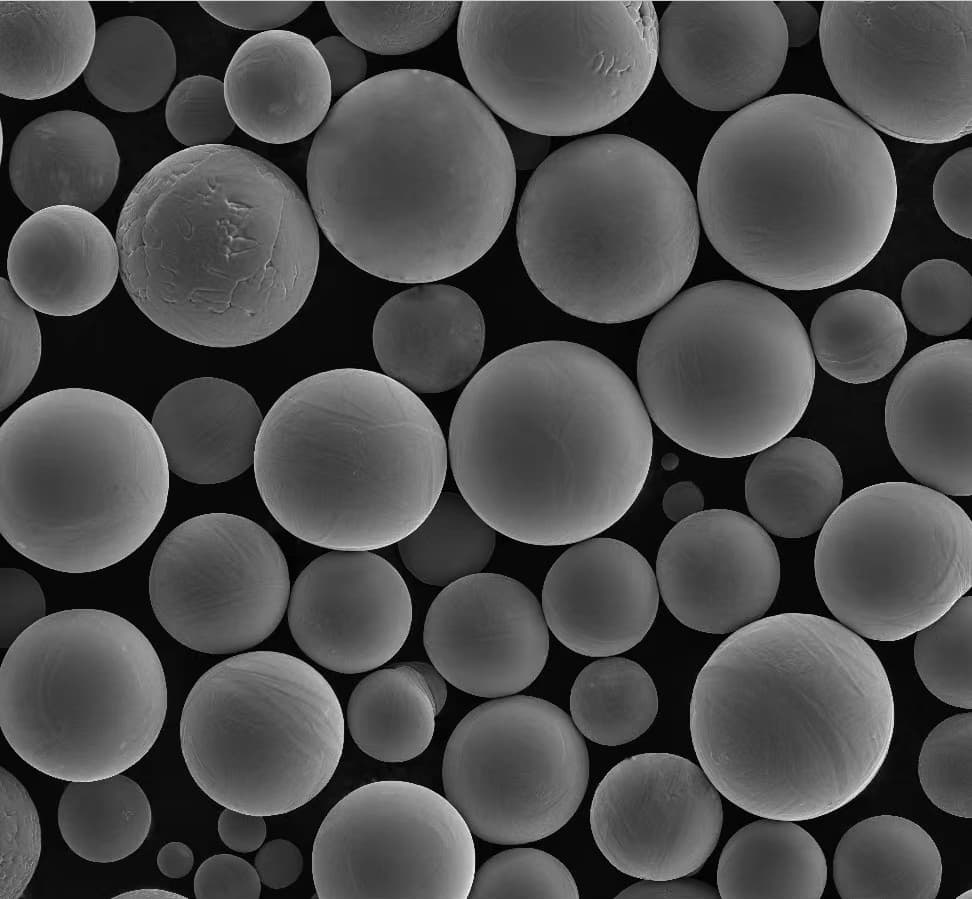
の特性と特徴 金属粉
| タイプ | 作曲 | プロパティ | アプリケーション |
|---|---|---|---|
| アルミニウムパウダー | Pure aluminum or alloys | 軽量、導電性、耐食性 | Automotive, aerospace, fireworks |
| 銅粉 | Pure copper or alloys | Conductive, antimicrobial | Electronics, batteries, conductive inks |
| 鉄粉 | Pure iron or alloys | Magnetic, strong, cost-effective | Powder metallurgy, automotive |
| チタンパウダー | Pure titanium or alloys | Strong, lightweight, biocompatible | 航空宇宙、医療用インプラント |
| ニッケルパウダー | Pure nickel or alloys | Corrosion-resistant, stable at high temps | Batteries, catalysts, electronics |
| ステンレススチール・パウダー | Iron-chromium alloys | Corrosion-resistant, strong, wear-resistant | 医療機器、食品加工 |
| コバルトパウダー | Pure cobalt or alloys | High melting point, magnetic, wear-resistant | High-performance alloys, batteries |
| 亜鉛パウダー | Pure zinc or alloys | Anti-corrosion, electrochemical | Protective coatings, batteries |
| タングステンパウダー | Pure tungsten or alloys | High density, high melting point, wear-resistant | High-temp applications, radiation shielding |
| マグネシウム・パウダー | Pure magnesium or alloys | Lightweight, high specific strength, machinable | Aerospace, automotive, electronics |
Applications of Metallic Powders
増材製造
Additive manufacturing, or 3D printing, is revolutionizing how we produce complex parts. Metallic powders are essential in this process, allowing for high precision and material efficiency. Metals like titanium and aluminum are particularly popular in aerospace and medical industries due to their lightweight and strong properties.
粉末冶金
Powder metallurgy is a manufacturing process where metallic powders are compacted and sintered to create solid parts. This method is cost-effective and allows for producing components with intricate shapes and specific properties, commonly used in automotive and industrial applications.
熱処理スプレー
Thermal spraying involves spraying metallic powders onto surfaces to create coatings that enhance wear resistance, corrosion resistance, or thermal insulation. This technique is widely used in aerospace, automotive, and industrial machinery.
メタル射出成形(MIM)
MIM combines the versatility of plastic injection molding with the strength and integrity of metal. Metallic powders are mixed with a binder to create a feedstock, which is then injected into a mold. This process is ideal for producing small, complex parts with high precision.
Batteries
Metallic powders like nickel and cobalt are crucial in battery production, especially in rechargeable batteries like lithium-ion. These metals provide the necessary electrochemical properties to store and release energy efficiently.
エレクトロニクス
Copper and silver powders are commonly used in electronics due to their excellent electrical conductivity. They are used in conductive inks, printed circuits, and various electronic components.
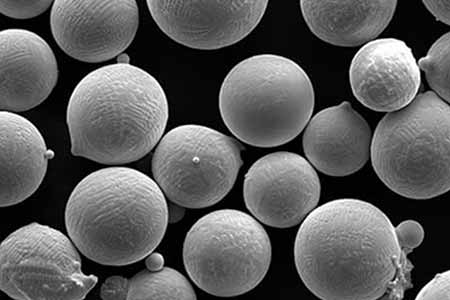
Comparing Metallic Powders: Advantages and Disadvantages
| タイプ | 利点 | 欠点 |
|---|---|---|
| アルミニウムパウダー | 軽量、耐食性、導電性 | Can be expensive, handling hazards |
| 銅粉 | Excellent conductivity, antimicrobial | Oxidizes easily, relatively expensive |
| 鉄粉 | Cost-effective, strong, magnetic | Prone to rust, requires protective coating |
| チタンパウダー | 高い強度対重量比、生体適合性 | 高価、粉末状では反応性 |
| ニッケルパウダー | Corrosion-resistant, high-temp stability | Expensive, health hazards if inhaled |
| ステンレススチール・パウダー | 耐食性、強度 | Expensive, harder to machine |
| コバルトパウダー | High melting point, magnetic, wear-resistant | Expensive, toxic if not handled properly |
| 亜鉛パウダー | Anti-corrosion, good electrochemical behavior | Can react with moisture, handling hazards |
| タングステンパウダー | High density, high melting point, wear-resistant | Very dense, hard to work with |
| マグネシウム・パウダー | Lightweight, high specific strength, machinable | Highly reactive, flammable in powder form |
仕様、サイズ、等級、規格
仕様とサイズ
| タイプ | サイズレンジ | 共通グレード | スタンダード |
|---|---|---|---|
| アルミニウムパウダー | 1-100 µm | 1050, 1100, 2024 | ASTM B928、ISO 6361 |
| 銅粉 | 0.5-45 µm | C11000、C10100 | ASTM B170,ISO 4503 |
| 鉄粉 | 1-200 µm | A1000, ASC100.29 | ASTM B783, ISO 4497 |
| チタンパウダー | 10-500 µm | CP1, Ti6Al4V | ASTM B348、ISO 5832-2 |
| ニッケルパウダー | 2-150 µm | Ni201, Ni205 | ASTM B330, ISO 6284 |
| ステンレススチール・パウダー | 5-150 µm | 304L、316L | ASTM A276, ISO 4954 |
| コバルトパウダー | 1-100 µm | CoCrMo, CoCrFeNi | ASTM F75, ISO 5832-12 |
| 亜鉛パウダー | 0.5-50 µm | Zn22, Zn94 | ASTM B860, ISO 3549 |
| タングステンパウダー | 0.1-200 µm | W1, W2 | ASMB777、ISO6848 |
| マグネシウム・パウダー | 1-500 µm | AZ31B, WE43 | ASTM B107, ISO 16220 |
サプライヤーと価格詳細
| サプライヤー | 金属粉 Available | 価格帯(kgあたり) | ウェブサイト |
|---|---|---|---|
| 先端材料 | Aluminum, Titanium, Copper, Nickel | $20 – $200 | www.advancedmaterials.com |
| 世界の金属粉末 | Iron, Stainless Steel, Zinc, Magnesium | $10 – $150 | www.globalmetalpowders.com |
| Powder Alloy Corporation | コバルト、ニッケル、タングステン | $50 – $300 | www.powderalloycorp.com |
| AMETEK 特殊金属製品 | Aluminum, Iron, Stainless Steel | $30 – $250 | www.ametekmetals.com |
| 金属粉の製造 | Copper, Zinc, Iron, Nickel | $15 – $180 | www.makinmetals.com |

FAQ
| 質問 | 回答 |
|---|---|
| What are metallic powders? | Finely divided particles of metals used in various industrial applications. |
| How are metallic powders produced? | Common methods include atomization, reduction, electrolysis, and mechanical alloying. |
| What are the main uses of metallic powders? | Additive manufacturing, powder metallurgy, thermal spraying, metal injection molding, and more. |
| What are the benefits of using metallic powders? | They allow for high precision, material efficiency, and the creation of complex shapes. |
| Are there any disadvantages to using metallic powders? | They can be costly, pose handling hazards, and require consistent quality control. |
| How should metallic powders be stored? | In a dry, cool place, away from any sources of ignition, and in tightly sealed containers. |
| Can metallic powders be recycled? | Yes, many metallic powders can be recycled, depending on the metal and the application. |
| What safety precautions are necessary when handling metallic powders? | Use protective gear, ensure proper ventilation, and follow all safety guidelines to prevent inhalation and fire hazards. |
| What industries benefit most from metallic powders? | Aerospace, automotive, electronics, medical, and industrial manufacturing. |
| How does the particle size of metallic powders affect their use? | Smaller particles offer higher surface area and reactivity, while larger particles may provide better flow characteristics. |
結論
Metallic powders are a critical component in modern manufacturing, offering unique properties and capabilities that traditional bulk metals can’t match. From their use in innovative additive manufacturing processes to their essential role in everyday products, metallic powders continue to push the boundaries of what’s possible in material science. Understanding their types, properties, and applications can open up a world of possibilities, whether you’re looking to improve product performance, explore new manufacturing techniques, or simply expand your knowledge.
3DP mETALについて
製品カテゴリー
お問い合わせはこちら
何かご質問はありますか?今すぐメッセージを送信してください。あなたのメッセージを受信後、全チームで検討させていただきます。
